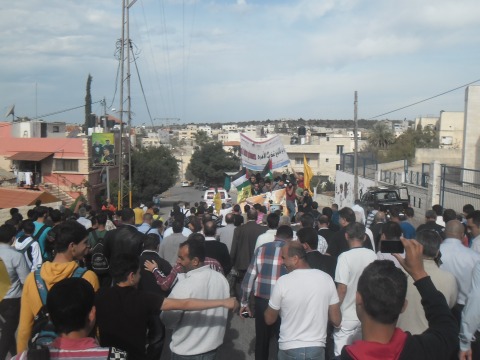Tag: Arrests
-

Viscous crackdown on unarmed protesters against the Prawer Plan just outside Ramallah
2nd December 2013 | International Solidarity Movement, Ramallah Team | Occupied Palestine Over 100 Palestinians and international activists took part in a non-violent demonstration on the 30th of November to protest against the Prawer Plan. The demonstration began at the al-Bireh municipality building in Ramallah and proceeded onto the Bet El settlement nearby. Demonstrators were met with stones then…
-

Daily brutality towards Palestinians in occupied Al-Khalil
2 December 2013 | International Solidarity Movement, Khalil Team | Hebron, Occupied Palestine Israeli forces regularly exercise brutal and irrational behaviour in the H2 area of Khalil (Hebron), which is under military control. An example of this treatment took place on Saturday 30th November, when 7 Israeli soldiers reacted to a group of Palestinian youth throwing…
-

Demonstration against Israeli forces as invasions and arrests increase in Azzoun
28th November 2013 | International Solidarity Movement, Nablus Team | Azzoun, Occupied Palestine Yesterday afternoon in Azzoun village, there was a demonstration attended by more than 250 people. This protest was against the Israeli forces’ continuing night invasions, arrests, and their treatment of Palestinian prisoners. The demonstration began in the center of Azzoun at noon, hundreds of…
